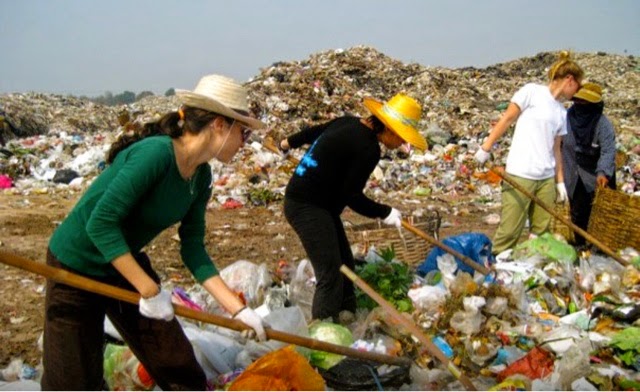Before visiting India with USC School of Social Work, I studied abroad in Northeast Thailand on a program focused on development, globalization and human rights. Similar to this program, I visited slum and rural communities and was exposed to marginalization and community organizing.
Even though I had already experienced extreme poverty and the marginalization of women when I lived in a landfill community where people's livelihoods were dependent on picking through Thailand's trash, I felt angst about coming to India because I had such a profound, but emotional experience seeing this poverty up close and personal. It was so powerful, in fact, that it changed the course of my life and provided the impetus for me to go into the field of social work.
One of the shortcomings of the program in Thailand was the lack of emphasis on women's issues. I was disappointed during my study abroad experience to only hear the voices of men and I wondered to myself: where are the women? I was very concerned that I would have a similar experience with this immersion program; that the experiences of women would be deemphasized while the patriarchal nature of India's society would be perpetuated. I was pleasantly surprised to learn about the growing prominence of women in this society and all the work NGOs and SHGs are doing to create more equality.
After visiting a variety of organizations that focus on women's empowerment in India, the men on the program expressed their concern about the lack of attention on men. My initial response was, who cares? In such a patriarchal society, men always have the voice and this is a small opportunity for us to learn about the small differences being made in the life of women in India. Women have experienced such inequality and oppression for so long that as a social worker I believe that is it our duty to prioritize this social issue in addressing our systemic barriers that prevent women from achieving political, economic and social equality. Although I still believe that these points are important, I also realized the critical role men play in reaching gender equality.
After meeting with the women at LEARN, a women-run union organization, and hearing about how the system of patriarchy has directly impacted their lives, it reminded me that gender equality cannot be achieved without considering the interests, needs, priorities contributions and cooperation of men. It's the fathers, husbands and brothers that also must be liberated from patriarchy in order to prevent the perpetuation of this oppressive and destructive system. Atmadevi Jaiswar, the president of LEARN explained that gender equality is when women are no longer "condemned to the prison of societal expectations that seem to enslave women to a life of hard labor, unwanted pregnancies and endless humiliation and violence." How can India make large-scale, marco changes without including the people who are most powerful? Until men are part of the solution, the status of women will stay stagnant.
Even though gender inequality is not as blatant in the United States, inequality still exists across the board. Men and women must work together at all levels to achieve gender equality.
-Charlotte Friedman




Reading this post has reminded me about the importance of self-awareness and social perception. From a social work lens, I think it is important that women who have been marginalized within society and their communities begin or maintain the dialogue on gender equality. Through this discussion, men and women alike should be able to acknowledge values and assess gender roles.
ReplyDeleteCharlotte, from my understanding in reading this article, I believe that the discussion at LEARN has inevitably offered a you and the rest of our colleagues considerations in addressing social issues of gender inequality for women. This post was great, and I especially like how you reflected on your work done in Thailand. Thanks!